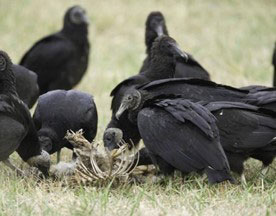Educational resources

- G9466, Controlling Nuisance Black Vultures in Missouri, MU Extension
- Managing Black Vulture Damage in Missouri brochure (PDF), USDA
- Wildlife Damage Management Technical Series: Vultures (PDF), USDA APHIS Wildlife Services
- Missouri Vultures, Missouri Department of Conservation
- Black Vulture Necropsy Reimbursement Process (PDF), Missouri Department of Agriculture
- Obtain a Black Vulture Depredation Permit (PDF), Missouri Farm Bureau
- Using Effigies to Disperse Nuisance Vulture Roosts (PDF), USDA APHIS-Wildlife Services
- Black Vulture Effigy Directions (PDF), University of Kentucky
Technical assistance
- Livestock producers are advised to contact USDA APHIS-Wildlife Services if you suspect livestock mortalities are the result of black vultures. Contact the State Office in Columbia, Missouri at 573-449-3033 ext. 10 to discuss the problem and/or schedule a site visit for a customized damage management plan and additional technical assistance. Assistance will be provided that can help determine if the mortality is a direct result of black vulture depredation or if vultures are just scavenging the carcass after the animal’s death from other causes. Information will be provided to address the problem and recommendations on management practices that can be used to prevent and control future vulture damage will be given.
- Once livestock depredation from black vultures has been confirmed (through necropsy services from a licensed veterinarian or a site visit from USDA APHIS-Wildlife Services), producers can obtain a permit free of charge for taking up to five birds annually from the Missouri Farm Bureau. Information on how to obtain a permit can be found at Missouri Farm Bureau Black Vulture Depredation Sub-Permit Program Application and Approval Process (PDF) or by calling 573-893-1416.
- Assistance with Livestock Necropsy Services: The process of conducting a necropsy to determine whether an animal was killed directly by black vultures is important as this provides confirmation. The Missouri Department of Agriculture has created a program in which the cost of livestock necropsy services will be reimbursed to producers who have livestock that have potentially been killed and or scavenged by black vultures. Information and more details about this process can be found at Black Vulture Necropsy Reimbursement Process (PDF). This information and proof of the cause of mortality is important and should help producers who are filling indemnity claims and seeking permits for lethal control. In addition, it is important to take pictures of the animal as soon as possible, including a full body shot, close ups of the head and anus, and any obvious wounds. If necessary, move the carcass somewhere where it will be difficult for scavengers to access until it can be necropsied.
- Missouri Department of Conservation Wildlife Damage biologists will provide assistance to clientele having issues with black vultures on their houses/boat docks or other private property. Contact them at 573-522-4115 ext. 3693.